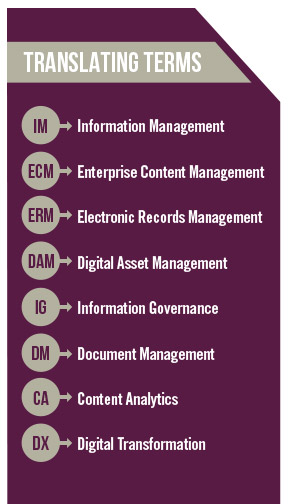This article appears in the Summer 2017 digital issue of DOCUMENT Strategy. Subscribe.

Image by: benstevens, ©2017 Getty Images
There have been several very interesting articles published in this magazine concerning digital transformation (DX). I must confess that the more time I devote to the basic concept of digital transformation, the more questions I have.

©2017 DOCUMENT Strategy
Since a document carries information, it is an asset. The information within documents is sent to specific applications, which manage specific tasks. More importantly, a document’s life cycle must follow both legal and operational rules. When organizations use documents in this context (i.e., digital), they will soon understand the efficiency to be gained, and therefore, there is always a transformation. The bottom line is that all the above, when combined, is merging into what one could call intelligent information management (IIM).
According to a very interesting report by AIIM, DX is being led by information technology (IT). While IT might handle the bits and pieces to make the solution work, the most important issues are within the “organizational” areas. Even the choice of the software tool should be based on “how the company works” or, even better, “how the company would like to work.” This clearly has nothing to do with IT, though IT has a lot of say on the infrastructure needed to implement whatever tool is chosen.
In that same report, the second choice for driving DX is corporate executives. This only seems natural, and the surprise here is the fact that this didn’t come in first. It’s this group that will feel potential inefficiencies and the legal dangers of their existing processes the most. Another surprise had to do with legal. After the scandals that led to legislation, such as the Sarbanes–Oxley Act, it should be in the interest of the legal department to make sure documents, and information in general, have fully controlled access and logs and that retention and destruction policies are clearly defined and enforced. All of this is so much easier in the digital world.
When there is such a momentum toward DX, one must think long and hard about its corresponding preservation. With a paper-based business, as it has been for the last millennia of civilization, conservation was a minor detail. Why? Because understanding the content was basically dependent on the human eye. Nothing else was needed. We even managed to understand the contents of 5,000-year-old Egyptian writings. Now, in the digital era, human vision is not enough to understand the contents of a document. There is a lot of research on this matter, some at top government levels, but it does not seem to be a subject worth much thought when talking about digital transformation.
All organizations have processes. People can now act on these processes remotely using their own smartphones or tablets. The question is, “Are these processes a replica of the old ones (i.e., paper-based) with IT support being the only difference? For many, this is good enough, because a lot of time is still saved. However, an additional component of this efficiency is the software functionalities used to surface knowledge—now available due to the digital world. However, these new capabilities demand a careful understanding of the functionalities needed and, even before that, the desired information about our processes if we had a magic wand.
DX has all the potential to deliver the best results, but it’s a lot more than just using fancy gadgets or sophisticated software. A deep understanding of the organization, its culture, wishes, and desires and correlating this with available IT tools is at the heart of its success.
Joao Penha-Lopes specializes in document management since 1998. He holds two postgraduate degrees in document management from the University Lusofona (Lisbon) and a PhD from Universidad de Alcala de Henares (Madrid) in 2013, with a thesis studying the economic benefits of electronic document management (EDM). He is an ARMA collaborator for publications and professionally acts as an advisor on critical information flows mostly for private corporations. Follow him on Twitter @JoaoPL1000.








